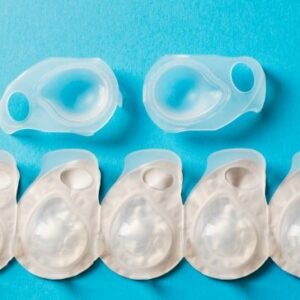Getting regular eye exams is as important as teeth cleanings and annual physicals. However, the different types of eye exams can leave you wondering which kind you need most. Can you get a contact lens exam without a comprehensive exam? What is a comprehensive exam, anyway? 
Contact lens exams are designed to get you the most comfortable fit for your contacts without damaging your eyes. Usually, you can get fitted for contacts during your comprehensive eye exam. Just let your eye doctor know beforehand. Comprehensive eye exams act as a baseline for both your eye and overall health, making them as important as regular visits to your medical doctor and dentist.
Contact Lens Exams
Eye exams for contact lenses differ from comprehensive eye exams (also known as general eye exams) in certain ways. Whether you’re updating your prescription or getting contacts for the first time, you’ll want to let us know so that we can schedule extra time for fitting your new contacts and updating your prescription.
What to Expect During a Contact Lens Exam
You’ll still need a comprehensive exam before being fitted for your new contacts. This includes standard tests to check various aspects of your eye health. Once that’s finished, we’ll begin your contact lens fitting. This will include questions about your lifestyle and what preferences you have about contact lenses.
This can include options for:
- Color contact lenses
- Daily contacts
- Contacts that can be worn overnight
- RGP or GP (rigid gas permeable) contacts
The type of contacts you choose can have a big impact on your daily routine. Daily-use contacts can cut down on cleaning and reduce your risk of contracting an eye infection and other problems.
To learn more about the benefits of daily contacts, read Dr. Thompson’s 5 Reasons Why Dailies Contacts Are the Smart Choice.
We’ll also want to discuss your eye care needs if you’re 40 or older. Reading small print and focusing on close-up objects becomes a bigger problem as you age. This is known as presbyopia and it’s a natural part of life. We can correct it by prescribing multifocal contact lenses or using other techniques.
Contact Lens Measurements
The next step will be measuring your cornea to get the right fit for your contacts. Contacts are not a one-size-fits-all sort of thing, and this should come as a relief if you’ve ever been disappointed by products that claim to be. A poor fit means that your contacts can be uncomfortable or even harmful to your eye, and we do everything possible to prevent that.
The cornea is a clear front surface of your eye. We use a keratometer to evaluate how light reflects from your cornea and determine the proper size and curve that your new contacts will need. The keratometer can only measure a small area of your cornea, so more measurements may be needed to find the right fit for you.
That’s where the corneal topographer comes in. This automated instrument gives us precise information about the surface of your entire cornea. The corneal topographer does this by measuring how light is reflected off of the surface of your eye. If necessary, we can also use wavefront measurements to decide the type of contacts that will suit your best.
Besides the cornea, we may also measure and evaluate your:
- Pupil
- Iris
- Tear film
All of these steps are essential for finding the best fit for your contacts. They help ensure that you feel comfortable while wearing contacts and that they don’t damage your eyes in any way.
Evaluating Your Lenses
The final step for getting your contact lenses fitted is the evaluation. We use a slit lamp (also known as a biomicroscope) to get a magnified look at your cornea as well as other tissues. This enables us to determine how healthy the front of your eyes are and catch any changes caused by wearing contacts.
Slit lamps are also used to test the fit of trial contact lenses. They give us the ability to see how they align and move while they rest on your eyes. You’ll wear the trial lenses for a few minutes to give them time to stabilize, and we evaluate how they fit on the surface of your eyes. You may need to have a couple of follow-ups for us to get a full picture of how your contacts should fit.
All of these steps are crucial for finding your perfect pair of contact lenses. It may sound time-consuming, but the final result will be a comfortable pair of lenses that provide you with crisp, clear vision without the need for prescription glasses.
Comprehensive Eye Exams
Comprehensive eye exams are important regardless of whether you plan on wearing contacts or not. While exams for contacts specifically deal with how your lenses fit, comprehensive exams, or annual eye exams, test your overall eye health and help determine your prescription.
The actual tests we perform during your comprehensive exam can vary. However, common tests we use include testing your:
- Peripheral vision for blind spots
- Eye alignment
- Eye movement
- Depth perception
- Eyes for color blindness
Another important aspect of comprehensive exams is eye dilation. Your eyes are a great indicator of your overall health, and dilation helps us to pick up on signs of serious health problems that may otherwise go unnoticed.
Thanks to comprehensive eye exams, we can detect serious vision and overall health issues such as:
- Cataracts
- Glaucoma
- Macular degeneration
- Dry eyes
- Diabetes
- Hypertension
- Autoimmune disorders
Your eyes are a window into the health of your entire body. Rather than simply updating your prescription, comprehensive eye exams should be considered as essential for your health as your yearly physical and regular dental cleanings.
When you come in for a contact lens exam, your eyes will be measured so your contacts will rest on them comfortably and safely. Let us know beforehand and we can schedule extra time to do this during your comprehensive exam. During these exams, we’ll check your baseline eye health as well as for other health issues that can be detected in your eyes.
Are you wanting to schedule a contact lens exam? Contact us today to schedule your appointment!
Hardin Valley Eyecare & Optical has been serving Knoxville since 2009. Dr. Travis Thompson and Dr. Catherine Abbott specialize in the diagnosis and treatment of a wide array of eye diseases, conditions, and problems and are committed to improving the quality of life in the Knoxville community through enhanced vision. Located at 10904 Spring Bluff Way, you can schedule an appointment online or give us a call at (865) 888-0892.





